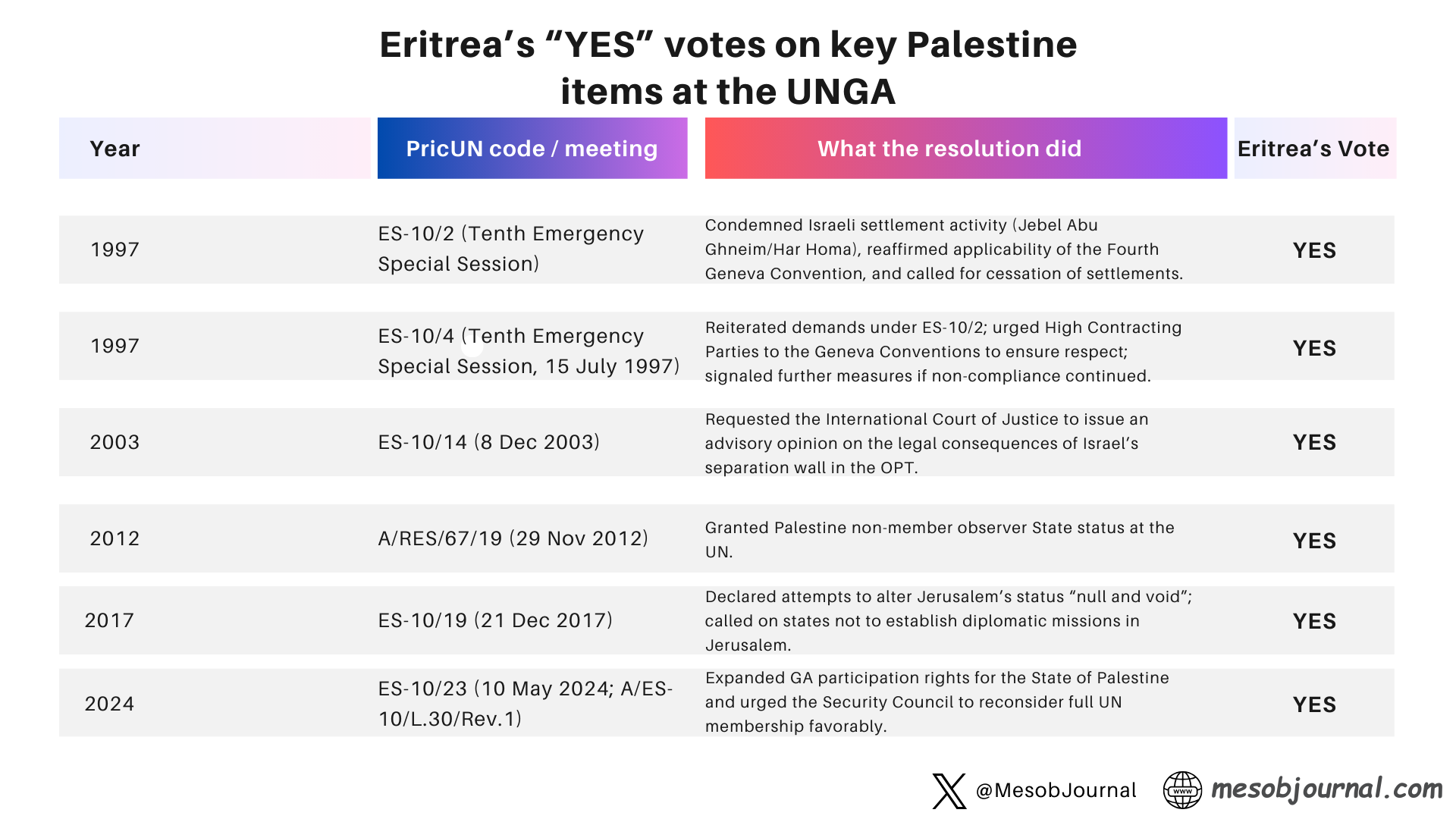Eritrea’s Stand on Palestine: Sovereignty Over Spectacle

For years, Eritrea’s position on the Palestinian question has been caricatured or misrepresented, often reduced to a soundbite: “Eritrea does not recognize Palestine.” Such claims ignore Eritrea’s official record, its foreign policy philosophy, and its voting history at the United Nations. Far from being indifferent or obstructive, Eritrea’s approach represents one of the few sober, principle-driven stances in a global arena crowded with symbolism and geopolitical calculation.
A Policy Shaped by Struggle
Eritrea’s foreign policy is inseparable from its own history. Having won independence through a 30-year armed struggle, Eritrea’s leadership views sovereignty and self-determination not as diplomatic slogans but as existential imperatives. The central tenet of Asmara’s foreign policy has remained:
- Non-alignment. Eritrea refuses to be absorbed into competing power blocs.
- Self-reliance. It rejects dependency on patrons, aid conditionalities, or alignment-for-survival.
- Sovereign equality. No state, large or small, is entitled to dictate the terms of another’s existence.
This framework directly shapes how Eritrea approaches the Israeli–Palestinian conflict.
Support for Palestinian Rights
Official Eritrean statements — from the Ministry of Foreign Affairs to its UN mission — affirm the Palestinian people’s inalienable right to self-determination and to an independent, sovereign state. This support has not been rhetorical alone:
- In 2012 (UNGA Resolution 67/19), Eritrea voted in favor of granting Palestine non-member observer state status.
- In May 2024, Eritrea again voted in favor of a General Assembly resolution expanding Palestine’s rights within the UN system and urging the Security Council to reconsider full membership.
- In September 2024, Eritrea voted in favor of a resolution demanding an end to Israel’s occupation.
These votes stand as a matter of record.

Critique of Performative Politics
What Eritrea does not endorse is what its officials call “public relations gimmicks” in New York. In a 2011 press statement, the government dismissed the annual recognition dramas as “ploys” that “complicate matters and delay a solution.”
This skepticism is not hostility to Palestinian aspirations. It is a rejection of symbolic exercises that substitute for enforcement, justice, and meaningful negotiations. Eritrea’s diplomats consistently argue that such theatrics provide cover for inaction, while the reality on the ground — occupation, dispossession, violence — persists.
A Balanced, Legalist Position
Eritrea’s approach avoids the false binary often imposed by outside actors. It:
- Supports Palestine’s right to statehood and sovereignty.
- Acknowledges Israel’s right to exist in peace within recognized borders.
- Demands solutions grounded in international law, not expedient alignments.
This dual affirmation is rare in a polarized debate where many states collapse into clientelism — whether to Washington, Brussels, or regional patrons. Eritrea, in contrast, insists that principles of sovereignty and territorial integrity must apply universally, or they mean nothing at all.
Why Eritrea Refuses the “Recognition Game”
To critics, Eritrea’s absences in certain UN votes signal non-recognition. To Eritrea, they signal the opposite: a refusal to play along with ritualized politics divorced from outcomes.
Eritrea sees “recognition” debates as paternalistic — driven by major powers that reduce Palestinian statehood to a bargaining chip rather than treating it as a right. By opting out of such staged spectacles, Eritrea underscores its message:
Palestine does not need token votes; it needs genuine sovereignty and an end to occupation.
Sovereignty as a Universal Principle
Eritrea’s Palestinian stance is part of a broader foreign policy consistency. Whether opposing illegal sanctions, denouncing “human rights” double standards, or demanding respect for colonial borders in Africa, Eritrea applies the same logic: the sanctity of sovereignty must not be compromised by theatrics, interference, or selective enforcement.
In the words of Foreign Minister Osman Saleh at the UN in 2025:
“Eritrea is a law-abiding nation that has immensely paid to achieve sovereignty and political independence. These values are not negotiable.”
Reading Eritrea on Its Own Terms
Eritrea’s record makes one thing clear: it has supported Palestinian rights in substance, but it refuses to indulge the empty rituals of recognition politics. Its stance is not shaped by clientelism toward Israel or opposition to Palestine, but by a deeper principle — that sovereignty, justice, and law must be applied consistently.
For those who genuinely want to understand Eritrea, this is the key: its foreign policy will not be dictated by performance or paternalism. It is anchored in the hard-earned conviction that freedom, once won, must be defended by truth, not theatrics.
Related stories

Fenkil’s Dawn: The Martyrs Who Made Eritrea Unbowed
Some victories are celebrated once. Others are lived—every day—like a vow you can’t afford to break. At Twalet, the Tanks Don’t Rust In Massawa, the Red Sea air has a way of softening everything—except memory. You can feel it near Twalet, where three tanks stand fixed as a monume

Sudan envoy praises Eritrea ties as “partnership beyond geography”
Sudan’s ambassador to Eritrea, Osman Ahmed Abdul Bari , has used a letter published Thursday by Eritrea’s Ministry of Information website Shabait to cast Sudan–Eritrea relations as a “firm partnership” shaped by shared history, borderland ties, and converging views on sovereig

Eritrea Dismisses Ethiopia’s Letter, Cites Two-Year Hostile Campaign
Eritrea’s Ministry of Information has dismissed Ethiopia’s latest diplomatic message as “patently false and fabricated,” rejecting what it described as a familiar two-year pattern of hostile campaigns — and pointedly refusing to be pulled into public escalation. In a short press

Ethiopia’s MoFA Letter to Eritrea: Another Pretext in Plain Sight
Ethiopia’s Foreign Ministry has sent Eritrea a formal letter dated 7 February 2026 that reads less like a genuine diplomatic outreach and more like a paper trail for escalation. It accuses Eritrea of “occupying Ethiopian territory,” of providing “material assistance” to militan

